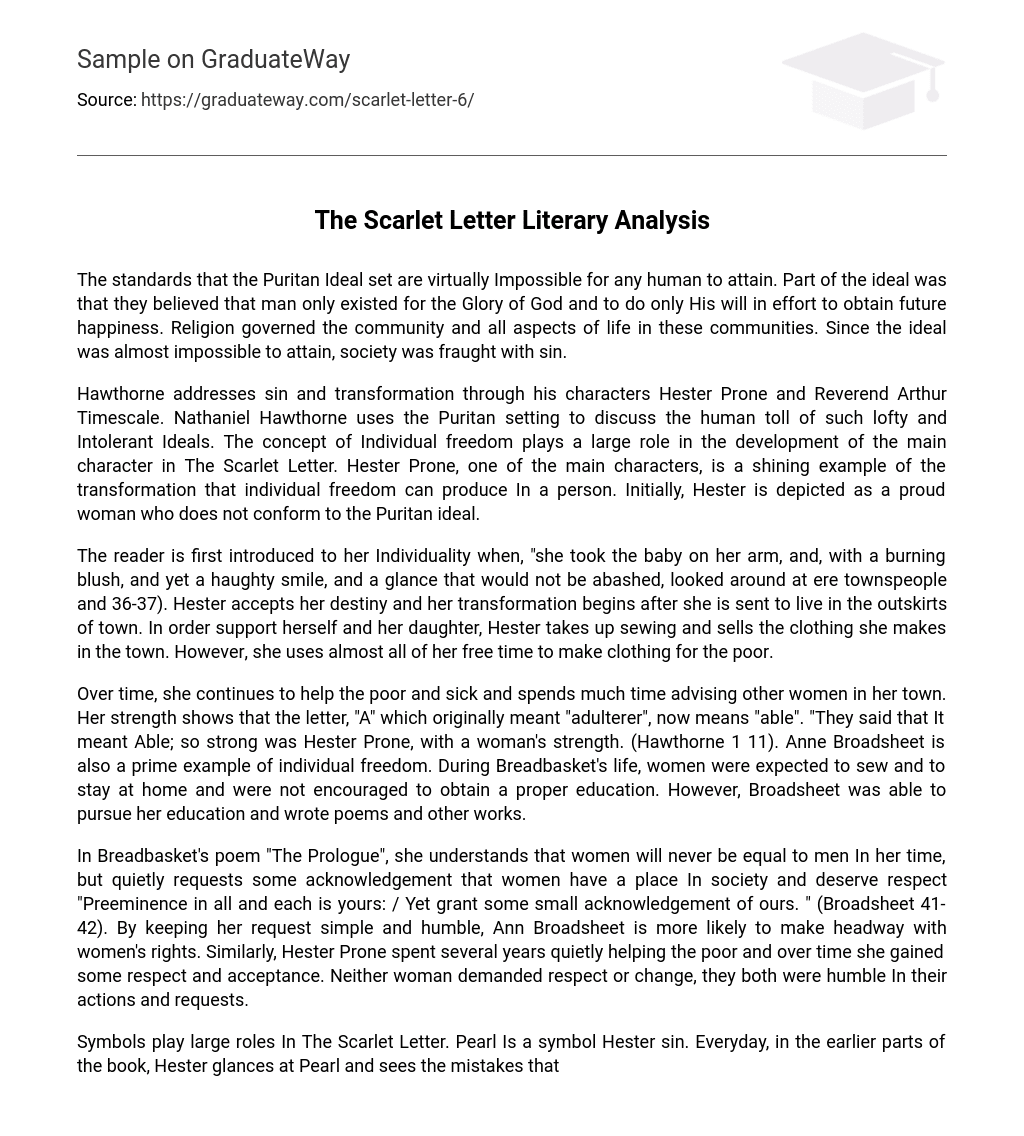The Puritan Ideal’s standards are almost unachievable by any individual. This ideal asserts that humans exist solely for God’s glory and should only fulfill His will to ultimately attain future happiness. The community and all aspects of life within it were governed by religion. Due to the near-impossibility of meeting this ideal, society was filled with sin.
In his work, Hawthorne explores sin and transformation through the characters Hester Prynne and Reverend Arthur Dimmesdale. By utilizing the Puritan backdrop, he delves into the detrimental effects of lofty and intolerant ideals on humanity. The theme of individual freedom greatly influences the growth of the protagonist in The Scarlet Letter. Hester Prynne, a central figure, serves as a prime example of the changes that can occur in a person through the exercise of individual freedom. Initially, Hester is portrayed as a proud woman who defies the Puritan norm.
Initially, the reader becomes aware of her Individuality when she confidently holds the baby and boldly gazes at the townspeople with a mixture of embarrassment and pride (36-37). Hester embraces her fate and embarks on a new journey when she is banished to the outskirts of the town. To sustain herself and her daughter, Hester becomes a seamstress and offers her handmade garments for sale in the town. Nevertheless, she dedicates most of her spare time to creating clothing for the less fortunate.
Over time, Hester Prone continues to assist the underprivileged and the ill, while also dedicating much of her time to providing guidance to other women in her community. Her resilience demonstrates that the letter “A”, which originally symbolized “adulterer”, now represents “able”. As the narrator observes, “They said that it meant Able; so strong was Hester Prone, with a woman’s strength” (Hawthorne 1 11). Anne Broadsheet serves as a prime example of personal liberty as well. In her era, women were expected to focus on sewing and homemaking, with little emphasis on acquiring a proper education. However, Broadsheet managed to pursue her academic interests and even authored poems and other literary works.
In Breadbasket’s poem “The Prologue”, she acknowledges that in her time, women will never be equal to men. However, she quietly pleads for recognition that women have a place in society and deserve respect, stating, “Preeminence in all and each is yours: / Yet grant some small acknowledgement of ours.” (Broadsheet 41-42). By maintaining a simple and humble request, Ann Broadsheet increases her chances of advancing women’s rights. Similarly, Hester Prone spent years silently assisting the less fortunate, eventually earning respect and acceptance. Neither woman demanded respect or change; rather, their actions and requests were humble.
The role of symbols in The Scarlet Letter is significant, particularly in relation to Pearl and Hester’s sin. At the start of the book, Hester often looks at Pearl and recognizes her own mistakes, as she is described as “a born outcast of the infantile world. An imp of evil emblem and product of sin” (Hawthorne 64). However, as the novel progresses, Pearl’s symbolism evolves into representing existence. Hester gradually embraces her destiny and gains strength from the fact that she must live for Pearl. In doing so, she conveys the Puritan belief that youthful innocence holds more value than educated sophistication.
Hester often worries about Pearl because she is a disobedient child with a strong sense of independence. Cotton Matter Nas, a minister in Boston and a pamphleteer, wrote “The Duties of Children to Their Parents”, which emphasizes obedience, a key principle in Puritanism. This clashes with Pearl’s character as she frequently disobeys Hester and throws temper tantrums. Throughout The Scarlet Letter, Pearl’s actions challenge the prevailing Puritan ideals of the time.
However, ultimately, despite her rebellious upbringing, Pearl becomes a wealthy woman who supports her mother, who has returned to Boston. Within the Puritan community, pastors are looked upon for guidance and support in living a spiritually Christian life. In Nathaniel Hawthorne’s novel, The Scarlet Letter, Reverend Arthur Timescale is highly esteemed. Although Timescale had an affair with Hester, he never acknowledged his wrongdoing. He offers Hester the opportunity to reveal him as Pearl’s father, yet she refuses to speak and keeps his identity concealed. “I will not speak!” answered Hester, turning pale but acknowledging the accusation. (Hawthorne 47). The guilt eventually consumes Timescale, both metaphorically and literally, leading to his demise. His inability to conform to the Puritan ideals of his time is evident. Pastors were meant to maintain purity of heart and be free from sin. However, by engaging in a sexual relationship with Hester, he becomes tainted with guilt and sin, which gradually eats away at his soul.
Arthur Timescale epitomizes a man who desperately needs God’s love in the face of overwhelming sin. Edward Tailor, a poet who adhered to Puritan ideals, explores the dilemma between God’s love and human sin in his work “Meditation 1”. Both Arthur and Taylor hail from England, earned recognition for their theology, and immigrated to the colonies. In “Meditation 1”, Taylor expresses the concept of God’s boundless love for humanity despite their inherently sinful nature: “What Love is this f thin, that Cannot bee/Len thin Infinity’ (Taylor 1-2). Timescale suffered from his sins, causing an erosion of his mind, soul, and body.
Taylor believed that the Department of Defense (DOD) resolved mankind’s sin by offering Jesus as a gift and shedding his blood for everyone’s redemption. In Taylor’s words, “There our Evans might bleed through thy Person, quenching those flames that would otherwise consume us” (Taylor 11-12). Despite Timescale’s morally impure life, he ultimately finds solace in confessing his sins and embracing God’s unwavering love. However, the strict standards of the Puritan ideal often caused devastation in The Scarlet Letter. Hester Prone and Reverend Arthur Timescale defy these ideals by engaging in a disastrous affair, sullied further by symbolic elements of their transgressions.





